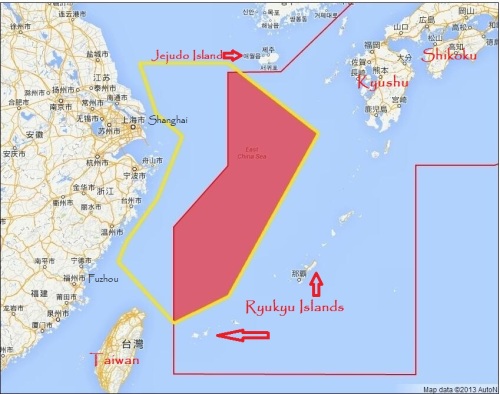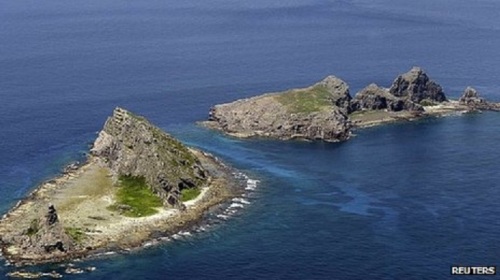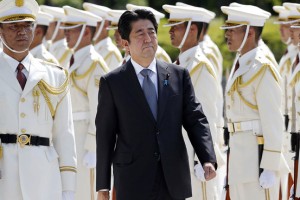 Area colored red is where China’s Air Defense Zone overlaps with Japan’s
Area colored red is where China’s Air Defense Zone overlaps with Japan’s
Peter Baker and Jane Perlez report for The New York Times, Nov. 29, 2013:
Even as China scrambled fighter jets to enforce its newly declared air defense zone, the Obama administration said on Friday that it was advising American commercial airlines to comply with China’s demands to be notified in advance of flights through the area.
While the United States continued to defy China by sending military planes into the zone unannounced, administration officials said they had made the decision to urge civilian planes to adhere to Beijing’s new rules in part because they worried about an unintended confrontation.
Although the officials made clear that the administration rejects China’s unilateral declaration of control of the airspace over a large area of the East China Sea, the guidance to the airlines could be interpreted in the region as a concession in the battle of wills with China.
“The U.S. government generally expects that U.S. carriers operating internationally will operate consistent with” notice requirements “issued by foreign countries,” the State Department said in a statement, adding that that “does not indicate U.S. government acceptance of China’s requirements.”
 The disputed Senkaku or Diaoyu islets
The disputed Senkaku or Diaoyu islets
The decision contrasted with that of Japan’s government this week, when it asked several Japanese airlines, which were voluntarily following China’s rules, to stop, apparently out of fear that complying with the rules would add legitimacy to Chinese claims to islands that sit below the now contested airspace. China’s newly declared zone, experts say, is intended mainly to whittle away at Japan’s hold on the islands, which it has long administered.
On Saturday, a Japanese Foreign Ministry official said, “We will not comment on what other countries are doing with regard to filing flight plans.” It was not immediately clear if the Obama administration had notified Japan, a close ally, of its decision.
An official at Japan’s Transport Ministry said it had no immediate change to its advice to Japanese airlines.
The American decision drew criticism from some quarters. Stephen Yates, a former Asia adviser to Dick Cheney when he was vice president, said it was “a bad move” that would undercut allies in the region that take a different stance.
But Strobe Talbott, a former deputy secretary of state under Bill Clinton and now president of the Brookings Institution, said it was important to avoid an accident while drawing a firm line. “The principal option is to be extremely clear that disputes” over territory “must be resolved through diplomacy and not unilateral action,” he said.
American officials said they began having talks with airlines on Wednesday and characterized the guidance Friday as simply following established international air protocols independent of any political deliberations. The American announcement came on the same day that Chinese state news media said that China sent jets aloft and that they identified two American surveillance planes and 10 Japanese aircraft in the air defense zone the country declared last weekend.
Although there was no indication that China’s air force showed any hostile intent, the move raised tensions. The Chinese had also sent jets on patrol into the contested airspace the day before, but Xinhua, the state-run news agency, indicated that the planes on Friday were scrambled specifically to respond to foreign jets in the area.
Earlier in the week, the United States sent unarmed B-52s into the area, and they proceeded unimpeded. China then appeared to back down somewhat from its initial declaration that planes must file advance flight plans or face possible military action.
The administration’s decision on Friday underscored the delicate position President Obama finds himself in, drawn into a geopolitical dispute that will test how far he is willing to go to contain China’s rising regional ambitions.
China’s move thrust the United States into the middle of the already prickly territorial clash between Beijing and Tokyo, a position the administration had avoided for months even while reiterating that the mutual defense treaty with Japan covers the islands. After the Chinese declaration last weekend, American officials feared that, if left unchallenged, the Chinese action would lead to ever greater claims elsewhere in the Pacific region.
But with planes flying so fast and in such proximity, the administration’s worries grew that an accident or an unintended confrontation could spiral out of control. A midair collision between a Chinese fighter jet and an American spy plane off the coast of China in 2001 killed the fighter pilot and forced the spy plane to make an emergency landing on Hainan Island, setting off a diplomatic episode until Beijing released the American crew and sent the plane back, broken into parts.
“The challenge here, as with April 2001, is when you have an unexpected crisis, things escalate very, very quickly without any plans for de-escalation,” said Jon M. Huntsman Jr., Mr. Obama’s first ambassador to China. “That’s one of the big challenges we have in the U.S.-China relationship.”
One of the biggest challenges for Mr. Obama will be navigating the complicated personalities of leaders in Tokyo and Beijing. Prime Minister Shinzo Abe of Japan, a strong nationalist, has vowed to stand firm against any Chinese encroachments, while President Xi Jinping of China has recently taken over as leader and has promised to advance a strong foreign policy meant to win his country more recognition as an international power.
The two countries have been at odds for years over the uninhabited islands known as Diaoyu by the Chinese and Senkaku by the Japanese. The United States does not take a position on the dispute.
Although administration officials believe China’s actions are mainly meant to give it an advantage in its struggle with Japan over the islands, experts on Asia say they also fit China’s larger goal of establishing itself as the dominant power in the region, displacing the United States.
Administration officials said they decided to proceed with routine military training and surveillance flights so as not to legitimize China’s assertion of control over the airspace or encourage it to establish a similar air zone over the South China Sea, where it has other territorial disputes. China had said it expected to set up other air defense zones, and experts said they expected one to cover that sea.
“We don’t want this to be the first in what would be a series of assertive moves,” said an administration official, who insisted on anonymity to discuss a delicate diplomatic matter. “The whole area’s fraught.”
Mr. Obama is sending Vice President Joseph R. Biden Jr. to the region next week, when he will meet with Mr. Xi and Mr. Abe as well as South Korea’s leader. Although the trip was previously scheduled, it will put Mr. Biden in the center of the dispute, and aides said he would deliver a message of caution to both sides to avoid escalation.
Many countries, including the United States and Japan, have air defense zones, but the coordinates of the Chinese zone overlap those of Japan, South Korea and Taiwan.
Peter Dutton, the director of the China Maritime Studies Institute at the United States Naval War College, said the new air zone also gives China a legal structure to intercept American surveillance flights in international airspace, which have long irritated Beijing. “It is clear that the Chinese do not seek regional stability on any level,” he said. “They intend to be disruptive in order to remake the Asian regional system in accordance with their preferences.”
H/t CODA’s Sol Sanders
See also “China’s irredentist nationalism and the six wars to come,” Sept. 23, 2013.




Reblogged this on Brittius.com and commented:
Japan, raises. China, calls. The street hustling organizer, folds like a cheap camera.
LikeLike
Neville Chamberlain & President Obama: Appeasement defined as,”.to buy off (an aggressor) by concessions usu. at the sacrifice of principles>” Plus maybe Peaceful Coexistence, to dig up a dead horse term, from the Cold War ERA go figger??.Yes Mr. Brittius I do agree with your capsule assessment of Obama>>>><<<<<<
LikeLike
LikeLike
Clearly, Beijing has decided to increase the probability of conflict in waters contingent to its mainland. Choosing not to accept the advice of Deng Xiaoping to wait (some unspecified time) before aggressively pursuing what it sees as its national interests–the present government has decided to establish “air defense identification zones” (ADIZs) over contested territories in what can only be an unnecessary provocation designed to outrage its neighbors. For Beijing, the establishment of the ADIZs is part of a long range strategy to insinuate the People’s Republic of China as a formidable actor with which the nations of the region must contend (conceivably displacing the United States). Since the establishment and administration of ADIZs is not governed by any applicable international law, Beijing can insist on requirements that could very well impede civilian or military aircraft in the commission of their duties.
The Japanese have chosen to defy Beijing; the United States apparently has not–although it remains unclear whether Washington will comply with Beijing’s demand that military flights duly identify themselves in ADIZ airspace. The next move by Beijing is to establish similar ADIZs in the South China Sea region–where it is engaged in potentially fractious dispute over territorial claims with the Philippines, Vietnam, as well as Singapore and Malaysia. A dispute with Indonesia is very close to the surface.
Beijing seems to have selected this time to embark on this adventure because Washington’s grip on foreign policy seems, at best, tentative and indecisive. There have been “red lines” proclaimed only to be abandoned for unclear purpose–and agreements with Iran that give every appearance of allowing crippling concessions at the cost of the security of allies–at a time when the United States is reducing its allocations for the maintenance of its armed forces.. Beijing’s actions at this time appear characteristically astute and self-serving, if dangerous. Much depends on the behavior of those in authority in Washington.
LikeLike
Classic move by The Obamination: Feed your ally a bit of false hope, getting them to commit to a firm stance… and then chop them off at the knees by caving ourselves, leaving the ally to dangle in the wind with their ass exposed. I do so despise this president. He is the least qualified, most radical president ever.
LikeLike
State Dept’s China Desk looking out for the PRC’s interests…
LikeLike
1961 fictional scenario-Bay of Pigs: President Obama today sent his Secretary of State Kerry to confer in Geneva Switzerland, with the Soviet Russian Foreign Minister; about the movement of Soviet missiles toward Cuba to set up a base, as threatened by Soviet Premier Khrushchev in his warning to the United States. In the meantime National Security Adviser Rice as been in contact with United Nations representatives, to send an intermediary liaison from reportedly Communist East Germany, to establish contacts with The Castro Regime. Finally, the international crisis was resolved with apparent success, according to WH Press Secretary Jay Carney–when it was learned behind the scenes the Administration worked out a compromise. Which would allow the Soviets to set up their missile base in The Bay of Pigs ( as it was learned Soviets, declared missile will be set up for defensive purposes only in their alliance with the nation of Cuba)–but only under United Nations supervision and oversight. Later in a National Press Conference on all the three major networks, President Obama hailed this decision a victory for world peace and for peaceful co-existence with the Soviet Union, to avoid World War 3. That ends my fractured fairy tale for now..,
LikeLike
Chicken Obama – The President of United States
LikeLike
Thank you for this informative post, and thank you Dr. Gregor for your thorough analysis. The Obama administration holds no credibility, and America’s indebtedness to China is their joker card.
LikeLike